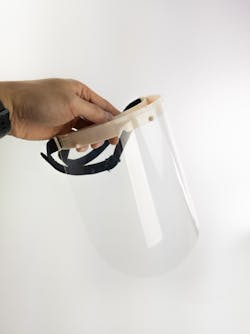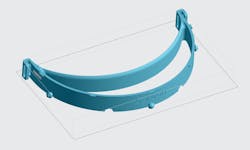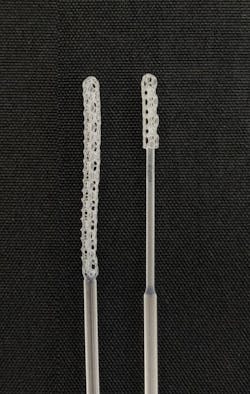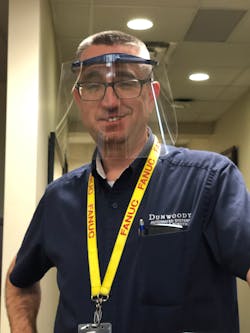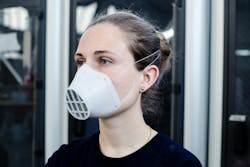3-D printer manufacturers begin producing personal protective equipment
Several 3-D printer companies are trying to help health-care workers around the world who are facing an acute shortage of critical medical safety and testing equipment because of the COVID-19 pandemic.
The face shield has three components: a transparent film, head bracket and head strap. The transparent film is created using a seven-gauge clear PET or similar plastic film. The head bracket is 3-D printed using select Carbon materials. The head strap is created using rubber or elastic bands.
The face shields are reusable, and the transparent film and the head bracket can be chemically disinfected with a product like isopropanol at a 70 percent concentration, according to the company. As an alternative, a user could remove and replace the transparent film and disinfect just the head bracket for re-use.
According to Carbon, “Face shields are considered a Class I exempt device, so we don't need FDA approval per the guidance from the FDA.”
Carbon now is fulfilling requests from hospitals and health-care providers “as best we can.”
Production at Carbon’s facilities in California has pivoted exclusively to respond to COVID-19, according to a statement the company provided to Plastics Machinery Magazine. Carbon also is working with its global network of customers and partners, as well as other 3-D printer makers, such as HP, to address the medical supply shortage. The company recently held a webinar with more than 300 members of its global network of customers and partners interested in making the face shields.
In addition, hospitals and health-care providers in critical need of face shields can submit a request form through the Carbon website, and the company will attempt to find a nearby production partner.
Carbon designers also are working in partnership with several health-care institutions on designs to 3-D print test swabs to increase COVID-19 testing capacity. Multiple designs are undergoing clinical assessment, according to the company.
In less than one week, Carbon produced at least 10 swab designs, several of which were undergoing clinical evaluation.
“We are working as quickly as possible with three partners to produce these swabs and expect that organizations will be able to place orders for swabs in short order,” according to a company statement. “The crisis – its scale and its severity – has taken us and the world by surprise.”
Carbon encourages companies, governments and others to reach out to the company or its partners to see how they can fulfill urgent production needs for polymeric parts.
“In particular, we have resins that have the requisite properties to make complex fluid and gas/air plumbing fixtures; electronic housings, connectors and closures; molds for making other products including silicone diaphragms and pumping systems, and elastomeric components.”
Stratasys
Stratasys is donating its 3-D printing resources and expertise to produce PPE for medical personnel.
The company also is assembling a coalition of companies and universities to produce face shields using 3-D printers. The coalition recently numbered more than 150 and included Boeing, General Atomics, Medtronic, Dunwoody College of Technology, the University of Central Florida and the University of Minnesota.
“I have never seen collaboration across our industry the way I’ve been seeing it over the last couple weeks,” said Scott Drikakis, Stratasys’ health-care segment leader who is directing the company’s COVID-19 response in the Americas. “The need is dire, but we are getting the kind of commitments from our coalition partners that will make a real difference and help buy time to scale up the manufacturing of shields and other essential supplies.”
The company initially planned to create 5,000 face shields free of charge by the end of March 27 with more production possible in the future, but the company and its partners exceeded their goal last week. The company now expects it will produce another 11,000 face shields this week and 16,000 more during the following week.
The face shields include a 3-D printed frame and a clear plastic shield that covers the entire face.
Stratasys is assigning orders from health-care systems to each coalition member in the United States. It invites any 3-D printing shop that wants to print at least 100 visors to fill out an online form to receive an invitation.
In addition, Stratasys has developed a web page that offers updates to its response to the COVID-19 pandemic and how others can help.
The company said it plans to promote next week’s launch of the CoVent-19 Challenge, an initiative led by anesthesiology residents at Massachusetts General Hospital that will ask engineers and designers to develop a new rapidly deployable ventilator and other solutions to the ventilator shortage. In addition to promoting the challenge, Stratasys will provide prototyping services to the challenge finalists, according to the company. The challenge is open to individuals and teams. To find out more, visit ww.coventchallenge.com.
Wasp
CSP srl, which owns Wasp, an Italian 3-D printer manufacturer, has set aside research and development projects to use its R&D department for manufacturing PPE for health-care workers engaged in the fight against COVID-19, according to a company press release.
Wasp is using its printers to produce protective masks and helmets. It’s also making the instructions for making the equipment freely available to the public.
Wasp is printing a product it calls My Face Mask that is intended for use with a replaceable filter, provided by a third party. To reduce skin irritation and other issues associated with long-term use, each mask is custom-designed for the user’s face. The printing process begins with a 3-D scan of a subject’s face. The scan can be accomplished using any camera smartphone or a 3-D scanner.
The masks are then 3-D printed on a Delta Wasp 4070 Industrial 4.0 printer using polycaprolactone, an implantable biomaterial that’s appropriate for direct skin contact.
“Our goal was to make the mask perfectly ergonomic, following the facial features as a second skin, a result that we obtained using Blender CAD-modeling software,” the company announced in a press release.
My Face Mask is easily sanitized and can be reused many times, and the filter is easily replaceable. It takes about 4 hours to customize a perfectly fit face mask. Wasp is making the instructions freely available to the public.
The positive air flow protection helmet, named My Space, is a noncertified device developed over only a few days by WASP. It is undergoing internal tests to evaluate its strengths and weaknesses before it can be made available to health-care providers.
My Space is printed out of a light, transparent plastic material that covers the wearer’s nose, mouth, eyes and ears in a slightly pressurized casing. Fresh, clean air enters from the top of the helmet, and small holes near the ears allow for hearing. The holes can be closed if necessary, but they are designed so that a constant flow of air coming out from them prevents anything from entering. A 12-volt battery can power a fan in the helmet for several hours, according to WASP.
The company has made instructions for printing My Space helmets available on its website.
Wasp is working with partners in Europe to get its equipment into the hands of health-care providers; it does not know if it will seek certification for the appliances in the U.S.
Shining 3D
Shining 3D has made available on its website instructions on how to use an EP-A800 resin 3-D printer to produce medical goggles.
“Medical goggles are necessary medical supplies to overcome the epidemic situation,” Shining 3D wrote on its website. “Our EP-A800 resin 3-D printer can be used for a quick emergent production in the shortage period.”
Shining 3D is providing an STL [stereolithography] file for free download on its site that can be used for printing goggles using a photosensitive resin.
The company, acknowledges, “These goggles are not and have not been certified in the US by the FDA. Since this is an urgent situation and normally takes around 1 year for FDA approval, it's impossible for any 3-D printing company to get an FDA approval in such a short period of time for goggles or other possible medical protective gear."
Contact
Carbon Inc., Redwood City, Calif., 650-285-6307, www.carbon3d.com
Shining 3D Technology Inc., San Francisco, 415-259-4787, http://en.shining3d.com
Stratasys Ltd., Eden Prairie, Minn., 952-937-3000, www.stratasys.com
CSP srl, Massa Lombarda, Italy, 39-0545-87858, www.3dwasp.com/en/
About the Author
Bruce Geiselman
Senior Staff Reporter Bruce Geiselman covers extrusion, blow molding, additive manufacturing, automation and end markets including automotive and packaging. He also writes features, including In Other Words and Problem Solved, for Plastics Machinery & Manufacturing, Plastics Recycling and The Journal of Blow Molding. He has extensive experience in daily and magazine journalism.
